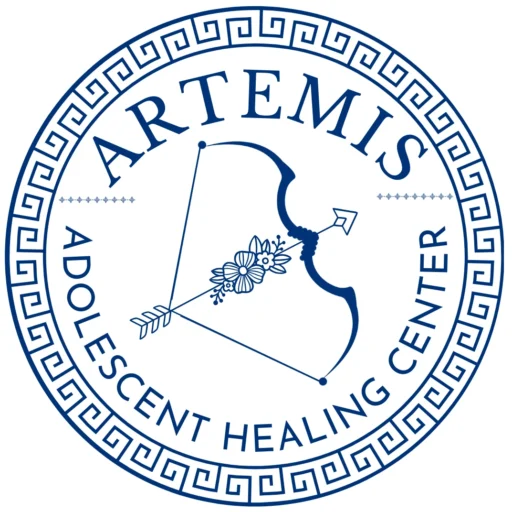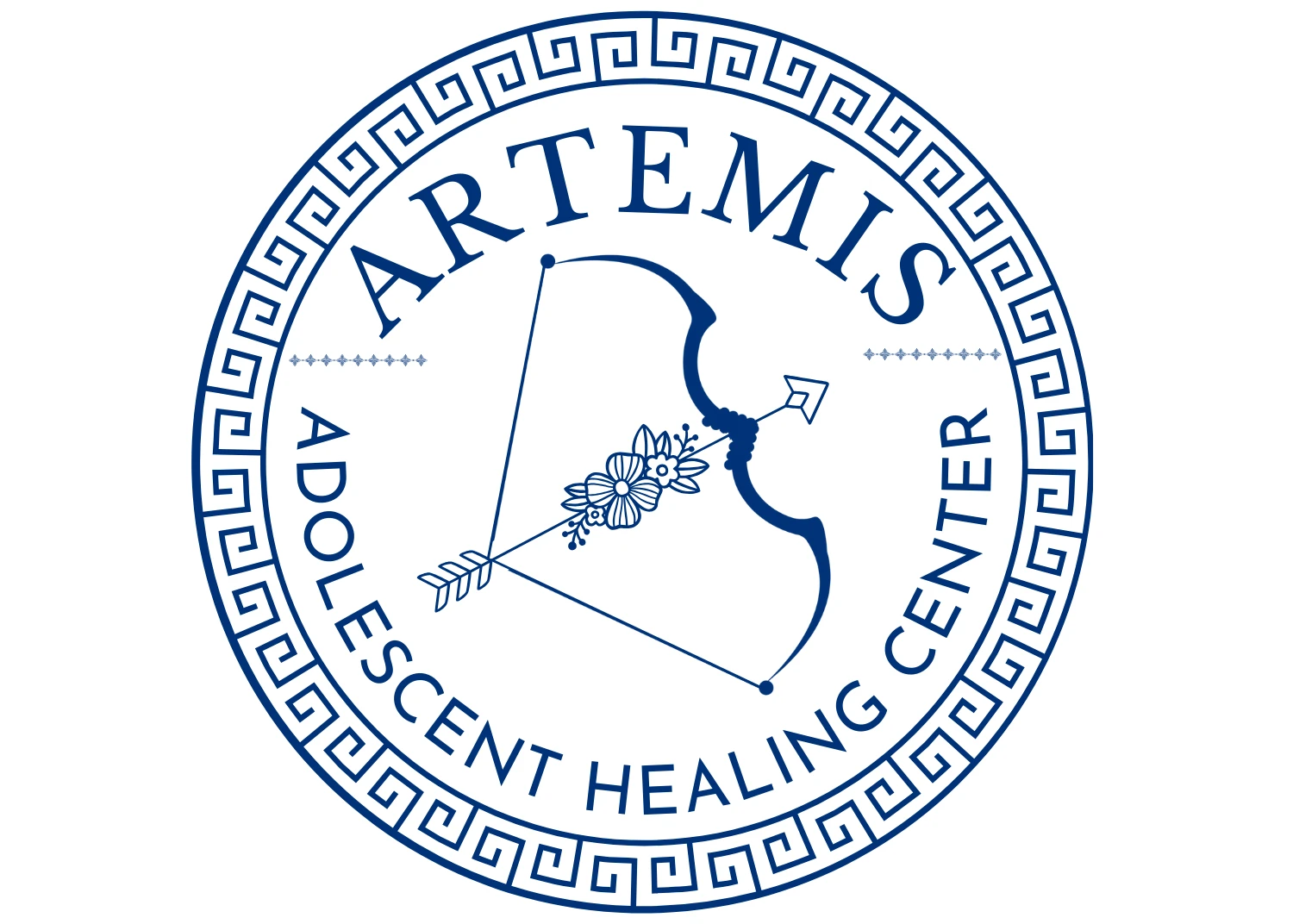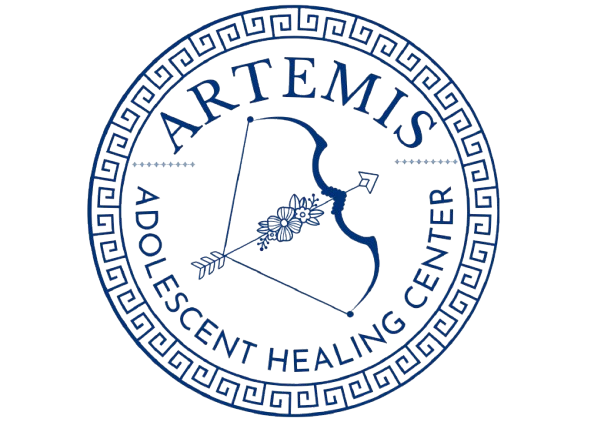Find Treatment Options for Teen Personality Disorders at Artemis
Diagnosing personality disorders in teens is critical to providing early intervention, which leads to better outcomes. While it’s true that some clinicians hesitate to provide a proper diagnosis due to rapid developmental changes in adolescents, others maintain that early identification can help provide support sooner.
Artemis Adolescent Healing Center is a licensed, accredited treatment center in Tucson. Because we specialize in mental disorders in teens, we know how to approach effective holistic care for adolescents with compassion and dignity. Each teen’s treatment plan will be as unique as their individual needs.
Emerging personality disorders in teens can be confusing for loved ones. Teens can be in a “up” mood one day and sink down low the next. We invite you to continue reading to learn about common personality disorders and other mental health conditions that can co-occur.
How Common Are Teenage Personality Disorders?

Teen personality disorders may occur more often than most parents would assume. The exact prevalence varies across studies, mainly because some adolescent psychiatry providers won’t offer a personality disorder diagnosis to someone under 19.
Still, research suggests that emerging personality disorders can appear during the teen years.
- A survey of 576 psychologists explained that personality disorders in adolescents may occur in about 10% to 15% of teenage clients. That number is much larger than most people could have imagined.
- Borderline Personality Disorder (BPD) is the most commonly studied of all the adolescent personality disorders; McLean Hospital estimates that as much as 3% of teens under 18 may struggle with BPD.
- McLean Hospital also reports that about 11% of teens receiving mental health services have a personality disorder. The rate increases even more in emergency departments, where about 78% of teens with suicidal behavior have BPD.
These mental health issues are more widespread than most parents know. Many are saddened to learn these statistics and simultaneously relieved to know they aren’t alone.
Get Confidential Personality Disorders Assessment
Understanding the Types of Personality Disorders in Teens
Personality disorders are best described as patterns of behaviors and perceptions of the inner sel that deviate from cultural expectations. While most people think of PDs presenting in adulthood, the signs often begin during adolescence, with many parents dismissing the unhealthy patterns of emotional expression as “teenage hormones.”
That assumption may be correct in an overwhelming majority of teens. But when erratic behaviors and unpredictable mood swings begin to dominate your lives, it’s time to seek help.
The American Psychological Association’s Diagnostic and Statistical Manual (DSM-5) has categorized each diagnosable type of personality disorder into distinct clusters to help mental health professionals make an accurate, early diagnosis and deliver the appropriate treatment.
Cluster A Personality Disorders – Odd and Eccentric Thinking
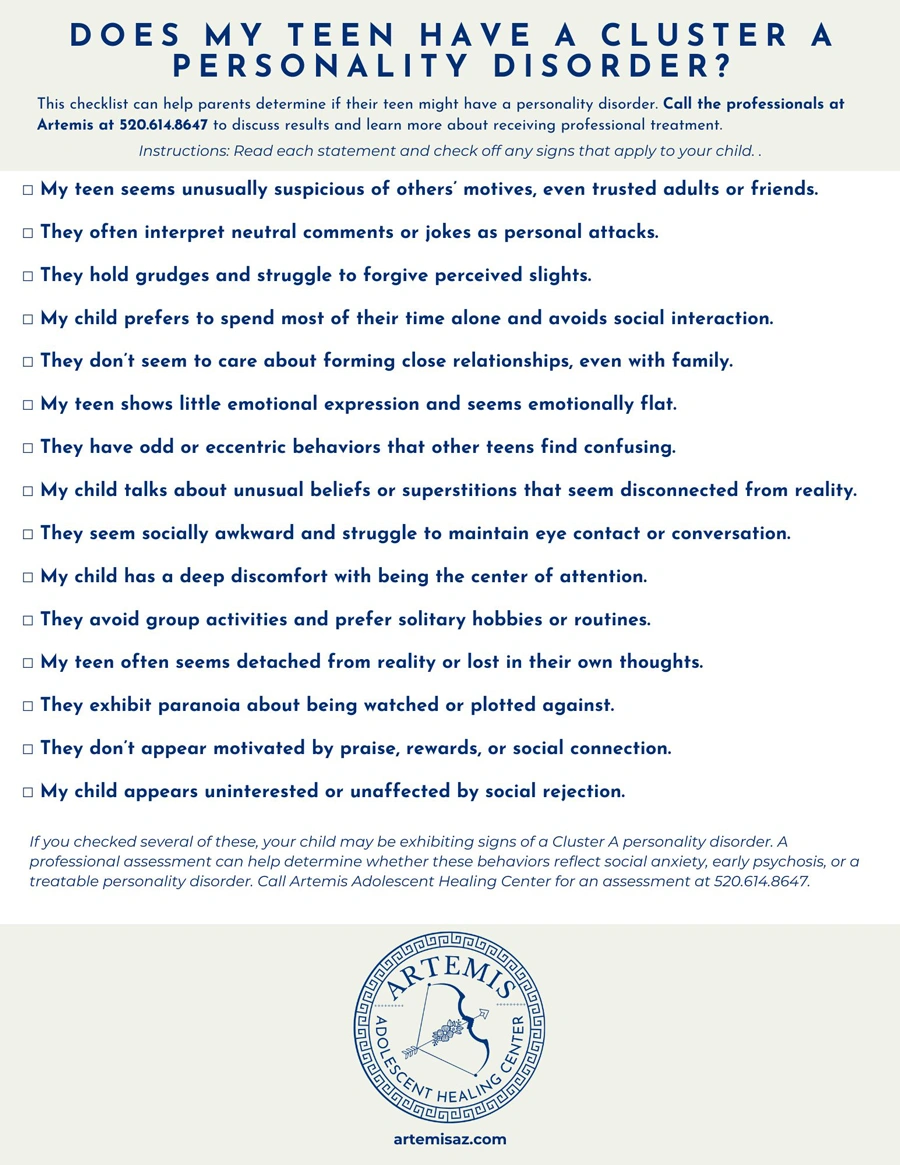
Cluster A personality disorders are marked by unusual thoughts and emotional detachment. While rare in adolescence, they can sometimes emerge during the teen years or early adulthood.
Paranoid Personality Disorder (PDD)
Teens with paranoid personality disorder often have extreme mistrust or suspicion of others. They misread harmless comments or phrases as hostile, won’t trust others with their secrets, and reject help. They often also hold grudges. The lack of trust can harm their ability to form friendships and maintain healthy relationships with family members.
Getting help early can be the key to changing the distorted thought processes and having less distress. Treatment for PDD often includes helping the teenager to shift to a more positive mindset and reshaping behaviors as they learn to trust others.
Schizotypal Personality Disorder (STPD)
Schizotypal personality disorder can mean having unusual belief systems and engaging in eccentric behaviors. It can lead to strained social interactions. Teens with STPD may have “magical” thinking, strange speech patterns, and few friends.
A treatment plan often focuses on talk therapy to improve social skills and change distorted thoughts. Some of the early traits may initially appear to overlap with psychosis, but they remain distinct and require a mental health professional to diagnose STPD accurately.
Schizoid Personality Disorder (SPD)
Those with schizoid personality disorder are often emotionally detached from others and prefer their own company. They appear aloof, withdrawn, or disinterested in personal relationships. Unlike social anxiety disorder, the detachment doesn’t stem from a place of fear but a true lack of desire to connect with others.
Psychotherapy can help with social skills and support healthy behaviors without forcing emotional expression or causing significant distress.
Cluster B Personality Disorders: Dramatic and Emotional Reactions
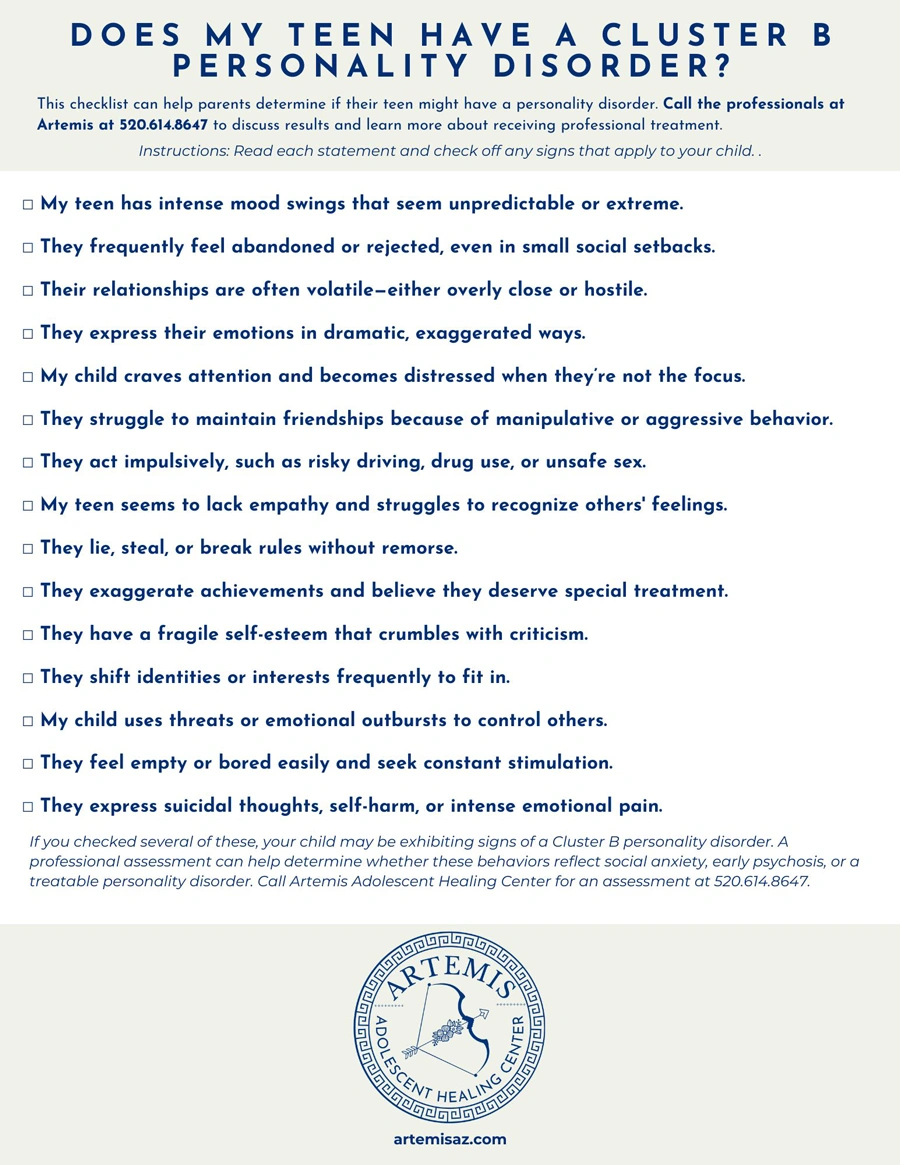
Cluster B personality disorders are the most likely to be diagnosed in teens.
Borderline Personality Disorder (BPD)
Teens with borderline personality disorder struggle with intense moodiness, impulse control, and fear of abandonment. As they begin dating, they have unstable relationships, which can follow them into adulthood without seeking support. They may have suicidal ideation or thoughts of self-harm, or engage in risky behaviors that show how little they value their own lives. It is treatable, especially when caught early. Treatment may include dialectical behavior therapy to replace thoughts of self-harming behavior with more balanced thoughts and actions.
Histrionic Personality Disorder (HPD)
Histrionic personality disorder is rare among teenage personality disorders. Still, the teens who do have it need to seek professional care. They are extremely emotional and sometimes engage in undesirable behaviors to seek attention and validation. These can include stirring up unnecessary drama, seductive behaviors, or telling exaggerated stories.
Antisocial Personality Disorder (ASPD)
Antisocial personality disorder is not formally diagnosed until the child reaches 18. Still, emerging personality disorders have symptoms that can be noted before their eighteenth birthday, including breaking rules, manipulating others, and lacking empathy.
Before they reach adulthood, antisocial personality disorder is usually called a conduct disorder. Early intervention should include behavioral sessions, family therapy, and often medications.
Narcissistic Personality Disorder (NPD)
Narcissistic teenage personality disorders come across as arrogance, entitlement, or someone dismissive of others’ feelings. However, these are not necessarily personality traits but behaviors masking one’s low self-worth. Narcissistic personality disorder brings grandiosity, an intense need for admiration, along with an utter lack of empathy.
When criticized, the person may have extremely sensitive feelings and difficulty with relationships with others. Like all people with personality disorders, these issues can improve during the treatment process. A treatment plan for histrionic personality disorder must include strategies to empower the teen and increase self-esteem.
Cluster C Personality Disorders
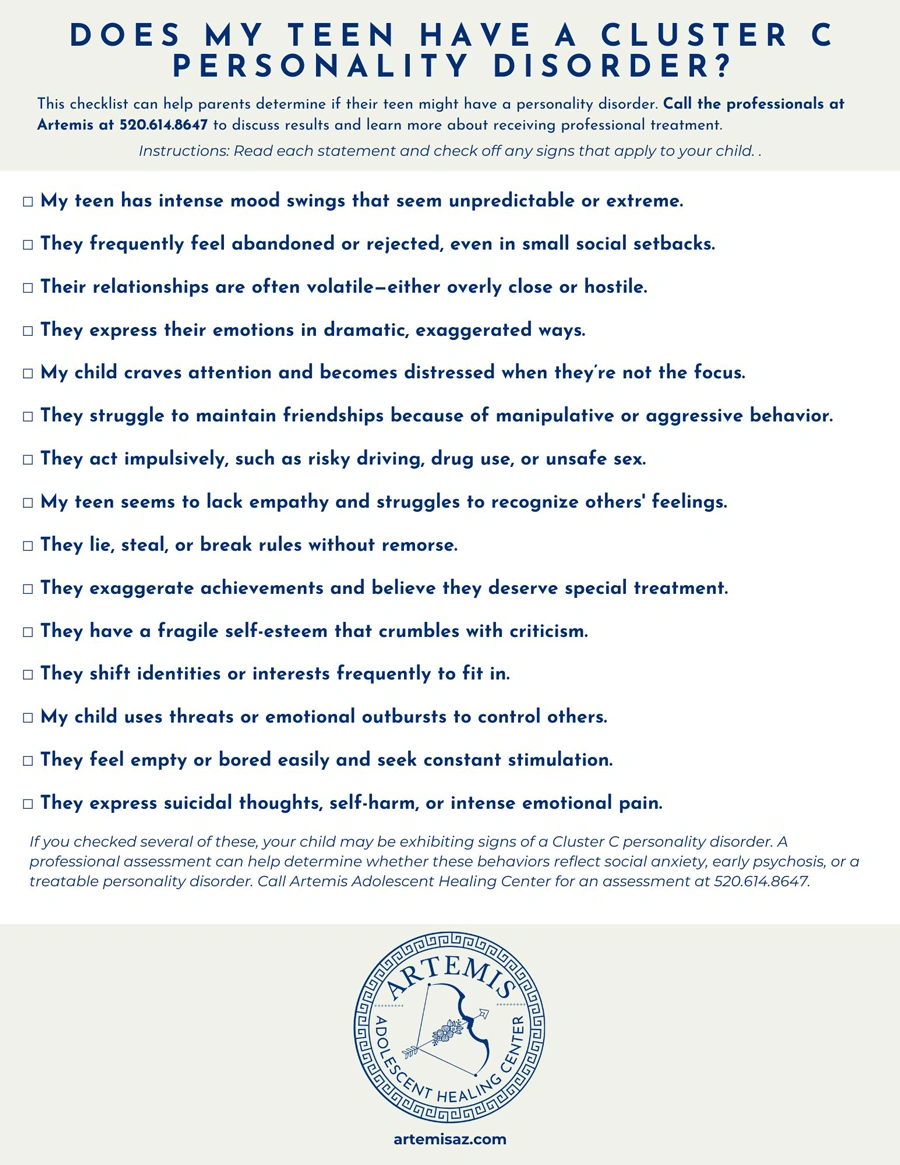
Personality disorders begin anytime from the teenage years to early adulthood within Cluster C. With these teenage personality disorders, the child has high anxiety and needs to feel control or reassured. The unpredictable behavior can overlap with general anxiety disorders, depression, or even a shy personality, making them harder to detect.
Obsessive-Compulsive Personality Disorder (OCPD)
Obsessive-compulsive personality disorder is not the same diagnosis as OCD, although these conditions can appear together. Teens with obsessive-compulsive personality disorder are rigid, prone to extreme perfectionism, and self-focused. They believe their ideas are correct, and others’ are wrong to the point of causing distress. Their inflexible nature means they struggle in school or relationships. The root cause is often the fear of failure. Consider an OCD Test to evaluate their symptoms.
On the other hand, OCD means repetitive, disruptive thoughts relieved by performing compulsive behaviors or rituals. The two mental health issues are distinct from one another.
Dependent Personality Disorder (DPD)
Teens with a dependent personality disorder diagnosis appear to adults as clingy or submissive. They have impairments in decision-making, often relying on others to make up their minds. They avoid all conflict, even sacrificing their self-worth to avoid being alone. This disorder can cause depression and anxiety that carries into adult life. Cognitive behavioral therapy can help clients identify and change negative thinking while also introducing healthy behaviors.
Avoidant Personality Disorder (AVPD)
Common symptoms of avoidant personality disorder include an unfounded fear of rejection, criticism, or embarrassment. Teens with avoidant personality disorder appear to be painfully shy or awkward, especially when they must face a new situation.
They’ll often withdraw from peers altogether. Unlike a healthy introverted personality, the behaviors come from deep insecurities and perceived judgment by others. Untreated personality disorders like AVPD can lower the teen’s education and further erode self-confidence. Therapy focuses on lowering risk factors by building resilience and self-esteem, often in peer group sessions.
Get Accredited Treatment Programs at Artemis
Lex Is an Artemis Success Story
‘Lex,’ 16, came to Artemis when their parent became worried about their dark thoughts and fantasies of hurting themself. Lex’s dad had left their family when Lex was 5, leaving their mother to work three part-time jobs to support two kids. Barely able to scrape by, their mother was a rock. Lex resented the time their mom spent working and didn’t like looking after their younger sibling. They seethed about their dad, who had never made a reappearance in their life. They’d simply walked away and vanished.
Lex grew into distorted thoughts, drew images of death on their notepads, and talked about death constantly. Their mother caught them cutting a few times and called Artemis. Lex had emerging borderline personality disorder, brought on by an intense fear of abandonment, thanks to their dad’s leaving and their mother’s grueling work schedule.
Outpatient therapy helped Lex sort through the feelings. They talked with a therapist a few times weekly and completed exercises like writing a goodbye letter to their dad, where they poured out their resentment and disdain. Nobody judged them for these emotions.
Lex made significant gains with time and is learning to trust people again. They’re also becoming more open to sharing their thoughts openly. They still attend weekly family therapy with their mom and younger sibling; they are becoming whole again.
Co-Occurring Disorders Often Present with Personality Disorder Clusters

When someone is emotionally unstable, personality disorders can be frightening for parents. To further complicate things, they don’t always occur alone. Teen personality disorders sometimes arise alongside other mental illnesses, called co-occurring disorders. Some commonly co-occurring mental illnesses are:
- Bipolar disorder
- General anxiety disorder
- Body dysmorphia, or dissatisfaction with physical appearance
- Post-traumatic stress disorder
- Panic disorder
- Substance abuse
- Obsessive-compulsive disorder
- Major depression
- Eating disorders (anorexia nervosa, binge eating disorder, or bulimia nervosa
The co-occurrence of more than one mental health challenge doesn’t mean the condition is untreatable. Instead, effective treatment means taking a closer look at environmental factors, family history, and medications that can support better mental health in addition to standard therapies.
Up To 100% of Rehab Costs Covered By Insurance
Artemis Offers Effective Treatment for Adolescent Personality Disorders
Are you worried about your teen’s behavior, moodiness, or developing personality. Don’t wait for the symptoms to get worse. Our experienced team of treatment professionals can assess your adolescent’s mental health. If we find an emerging personality disorder, we can address it through individual and family therapy, medications, and making healthy lifestyle changes.
If you have a group health care plan through your employer, your benefits cover mental health services. Feel free to reach out to our admissions specialists for information on applying coverage toward treatment plans. Call the Artemis Adolescent Healing Center team today to schedule a confidential assessment for your teen and learn how we can support your family.
